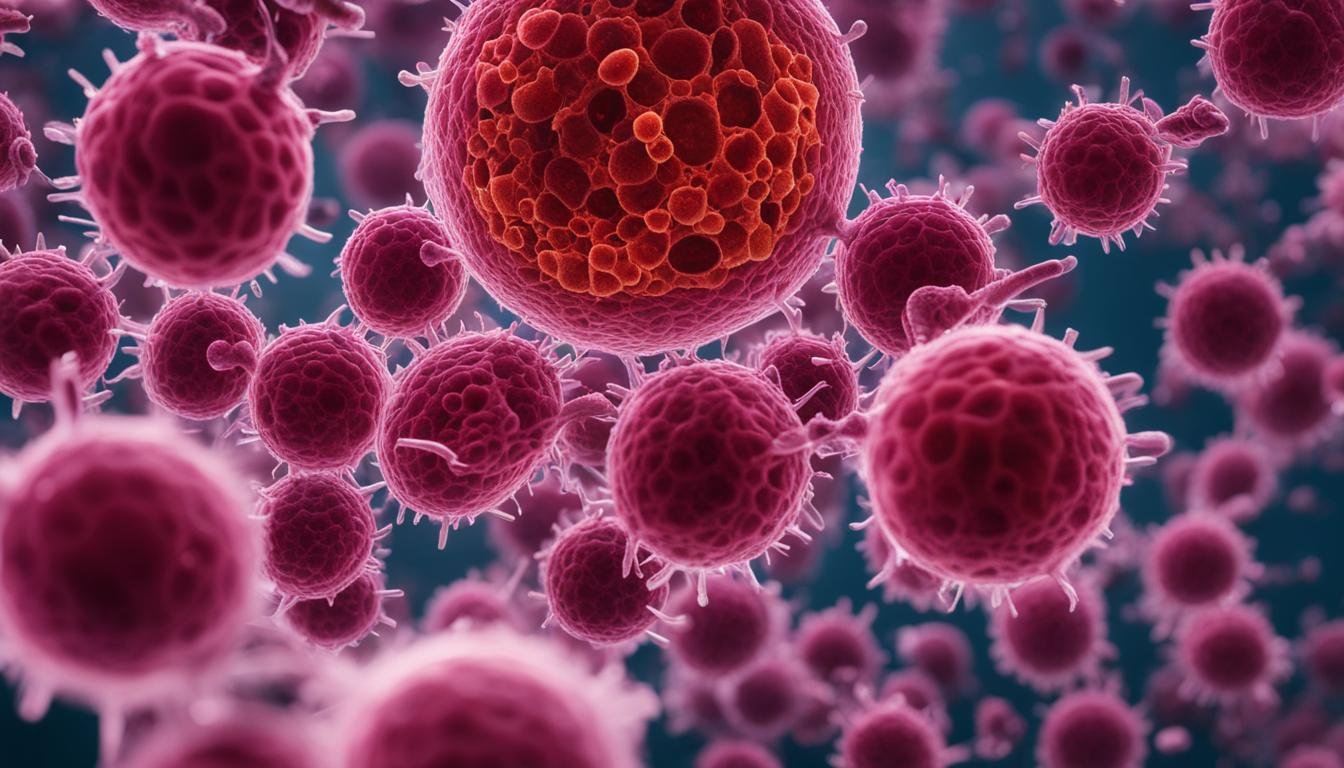Did you know around 40-50% of all infertility cases link back to men? Despite fertility often focusing on women, the man’s role is just as vital. Uncovering the whys behind male fertility offers key insights for those wishing to become parents.
Key Takeaways:
- Male fertility issues account for a significant percentage of infertility cases globally.
- Understanding the science of fertility in men is essential for individuals and couples seeking to conceive.
- Exploring the factors affecting male fertility can help improve reproductive outcomes.
- Advances in fertility research offer hope for overcoming male infertility challenges.
- Maintaining a healthy lifestyle and seeking support can positively impact male reproductive health.
Understanding Male Reproductive System Functions
The male reproductive system is key to a man’s ability to have children and stay healthy. It includes several important parts that act together. We will look at the testes, how sperm is made, and how hormones help in reproduction.
Testes: The Powerhouse of Fertility
The primary organs for making sperm and testosterone are the testes. They are also known as testicles. They are vital for a man’s reproductive and overall health.
These organs are located in the scrotum. They contain seminiferous tubules that make sperm in a process called spermatogenesis. This process turns germ cells into mature sperm cells.
The sperm then moves to the epididymis. This is a tube where sperm matures and becomes able to move. After this maturation, the sperm is ready for ejaculation and, possibly, to fertilize an egg.
Sperm Production: The Key to Fertility
Producing sperm is a detailed process within the testes. It starts with germ cells turning into mature sperm cells. This is called spermatogenesis.
This process includes several stages like cell growth, meiosis, and final maturation. Each step is important for creating healthy sperm.
The number and quality of sperm are big factors in a man’s fertility. Healthy sperm that moves well and looks right can fertilize an egg. Knowing how sperm is made helps us check a man’s reproductive health.
Hormone Regulation: Orchestrating Reproductive Functions
Hormones are crucial in running a man’s reproductive system. The hypothalamus, pituitary gland, and testes help keep hormone levels right for making babies.
The hypothalamus starts when it releases GnRH. This makes the pituitary gland create FSH and LH. They have their own jobs.
FSH helps the testes produce sperm. LH tells the testes to make testosterone. This hormone is vital for many things, including sperm making and sex drive.
In conclusion, the male reproductive system is a well-organized setup for making babies. It all starts with the testes, sperm making, and hormone use. Learning about these parts helps us understand fertility and look into any problems.
Factors Affecting Male Fertility
Many things can affect a man’s ability to have a baby. These include what he does, what’s around him, how old he is, and his genes. All these can change how good his sperm is. And good sperm is needed for making a baby. So, men should learn about and work on these things to have better chances to be a father.
Lifestyle choices: Your lifestyle can greatly influence your ability to have a child. For instance, smoking, too much drinking, and using drugs can all harm your sperm. The same goes for being overweight and eating badly. These can make your sperm fewer or less able to move.
Environmental factors: Some things in the world around us can also hurt our chances of fathering a child. Working with certain chemicals, being around pesticides, radiation, and heat can all damage sperm. To protect your fertility, try not to be around these harmful substances as much as you can.
Age: Getting older can affect men’s fertility, just like it does for women. When men age, the quality of their sperm often goes down. So, if you plan to have kids, it’s good to think about your age. Don’t be afraid to talk to a doctor about any concerns.
Genetic factors: Our genes also have a say in our ability to have children. Some genetic issues can make sperm work improperly, which makes conceiving harder. There are also changes in our genes that can make us more likely to be infertile. It could be wise for struggling couples to get genetic tests done.
| Factors Affecting Male Fertility | Impact |
|---|---|
| Lifestyle choices | Smoking, excessive alcohol consumption, and drug use can decrease sperm quality and fertility. |
| Environmental factors | Prolonged exposure to industrial chemicals, pesticides, radiation, and heat can harm sperm production and function. |
| Age | Advanced paternal age can lead to decreased sperm quality and fertility. |
| Genetic factors | Genetic disorders and mutations can impact sperm production and function, increasing the risk of infertility. |
Male Infertility Causes and Diagnosis
Various factors, from hormonal imbalances to genetic issues, can cause male infertility. Knowing these causes is key to diagnose and treat fertility problems. Fertility testing is essential to find out why a man might be infertile.
Potential Causes of Male Infertility
Male infertility has many possible causes. They include:
- Hormonal Imbalances can lower sperm count or affect sperm quality.
- Genetic Disorders may lower fertility by impacting sperm function.
- Infections, such as chlamydia, can damage the organs needed for reproduction.
- Reproductive Tract Obstructions might prevent sperm from reaching the egg.
Diagnostic Procedures for Male Infertility
Diagnosing male infertility needs several fertility tests. These tests help find out what’s causing the fertility problems. Here are some tests used for men:
- Semen Analysis checks sperm count, movement, and shape to evaluate sperm quality.
- Hormone Testing checks for imbalances in hormones like testosterone and FSH that can affect fertility.
- Genetic Testing looks for genetic problems that might lower fertility.
- Ultrasound lets doctors see the organs and check for any physical issues that could be affecting fertility.
By using these tests, specialists can pinpoint the causes behind male infertility. This knowledge helps develop personalized treatment plans. These plans aim to correct or manage the issues, hopefully improving the chances for conception.

Improving Sperm Health
The health of sperm is vital for male fertility. Luckily, improving it and boosting the odds of conceiving are possible. Several strategies can help in this quest.
1. Maintain a Healthy Weight
Weight matters for sperm health. Too much or too little weight can both harm sperm. It’s important to keep a healthy weight by exercising and eating well.
2. Reduce Stress
Chronic stress messes with hormones and can hurt sperm. Things like meditation or exercise can lower stress and improve reproductive health.
3. Avoid Harmful Substances
Tobacco, alcohol, and drugs are bad for sperm. Smoking lowers sperm count and movement. It’s vital to steer clear of these substances for good sperm quality.
4. Optimize Diet
Eating right is key for sperm health. A diet with lots of fruits, veggies, and whole grains is best. Antioxidants found in foods like berries and nuts protect sperm.
5. Engage in Regular Exercise
Physical activity boosts sperm quality. Things like jogging or swimming for 30 minutes a day are great. They help make more sperm.
6. Practice Safe Sex
Using protection against STIs is important for sperm health. STIs can harm sperm and cut fertility. Condoms are effective in preventing STIs.
7. Get Sufficient Sleep
Enough sleep is vital for reproductive health. It helps keep hormones and sperm quality in check. Try to sleep 7-8 hours each night for better sperm health.
“Improving sperm health is tied to various lifestyle choices. Changes in diet, exercise, and stress management can boost reproductive health. This, in turn, can increase the chances of successful conception.” – Dr. Smith, Fertility Specialist
Fertility Research and Advances
There are new developments in the study of male fertility. Researchers are looking at several areas, such as sperm quality, reproductive tech, and possible treatments. This work is vital for helping those dealing with fertility problems.
Studies on Sperm Quality
Scientists are studying sperm closely and its role in fertility. They’ve found links between good sperm health and lifestyle, diet, and what we’re exposed to. Learning how to boost sperm quality can help with having a baby.
“Understanding sperm quality is crucial for solving male infertility.” – Dr. James Anderson, Fertility Researcher
Also, they’re checking how diet, supplements, and habits affect sperm. These studies give advice on improving sperm health.
Advancements in Reproductive Technology
New technologies are changing how we treat male infertility. In vitro fertilization (IVF), sperm injection (ICSI), and sperm collection are some options. They help many people who struggle to conceive.
Scientists are making these methods even better. They are studying new ways to pick the best embryos. This could up the chances of a successful pregnancy.
Potential Future Treatments for Male Infertility
There’s hope on the horizon for male infertility. Research into stem cells, gene therapy, and regenerative medicine is picking up. These studies could bring new hope for those with hard-to-solve fertility issues.
But remember, these treatments are still in the research phase. More studies and tests are needed to make sure they are safe and work well.
The image shows why studying fertility is so important. It helps us learn more about male health and how to have healthy babies.
Fertility research is ongoing and essential. By keep pushing science ahead, researchers aim to bring joy to more families.
Common Male Infertility Treatments
Many treatments are available for male infertility. They help couples have children. These treatments improve fertility by working on the causes of male infertility. Let’s look at some common treatments.
1. Medication
Medicines can fix some causes of male infertility. They work on things like hormone problems. This can help make more sperm and boost fertility. Doctors who specialize in fertility can suggest the right medicine.
2. Surgery
Sometimes, surgery is needed if there are physical issues. It can fix problems like blockages or varicoceles. These are problems like swollen veins in the testicles. Repairing hernias can also help.
3. Assisted Reproductive Techniques
Techniques such as IUI and IVF can help couples overcome male infertility. These methods prepare and place sperm to help fertilize an egg. They increase the chance of success.
4. Lifestyle Modifications
Changing some habits can greatly improve male fertility. A healthy lifestyle can boost the chances of having a baby. This includes staying at a healthy weight, not smoking, and managing stress.
5. Fertility Specialists for Men
Seeing an expert in male fertility is key. These specialists are very knowledgeable. They offer custom treatment plans and support to help achieve pregnancy.
Working with these treatments and experts can significantly help. They offer hope for couples dealing with male infertility. Together, they improve the chances of having a baby.

Psychological Impact of Male Infertility
Male infertility hits both men and their partners hard. It can make them feel guilt and shame. They might also feel like they’re not good enough. This leads to a lot of stress and sadness. Talking about the mental side of male infertility is crucial. It helps people deal with it better and may even improve their chances of having a child.
Support and counseling
It’s important to get help from experts, support groups, or fertility counselors. These people understand what you’re going through. They offer a safe place to talk and learn how to cope.
Speaking to a pro who knows about male infertility’s mental effects can make a big difference. It might lower your stress and make you feel better.
Open communication and emotional support
Talking openly with your partner is key. It helps to share your feelings and fears. Doing this can make you closer. It also gives you the strength to face infertility together.
Your friends and family can provide a lot of emotional support. Having people who get what you’re going through is vital.
Managing stress and self-care
There are many ways to handle stress like meditation or taking up a hobby. Self-care is very important. It keeps you mentally and emotionally strong.
| Support Strategies for Coping with Male Infertility | Benefits |
|---|---|
| Seeking support from healthcare professionals, support groups, or therapists | – Provides a safe space to express emotions – Professional guidance and coping strategies – Connect with others facing similar challenges |
| Open communication and emotional support | – Strengthens the bond between partners – Provides understanding and empathy – Reduces feelings of isolation |
| Managing stress and self-care | – Reduces stress levels – Promotes overall well-being – Enhances mental and emotional health |
Dealing with male infertility is rough. But, with the right help and strategies, you and your partner can face these challenges together. This way, you find strength and hope for the future.
Lifestyle Factors and Male Fertility
Maximizing male fertility means looking at lifestyle choices. Things like smoking, drinking, taking drugs, and being near toxins can hurt how fertile men are. Learning about these risks and making changes can boost the odds of having a baby.
Smoking and Male Fertility
Smoking harms the ability for men to have kids. It can lower the number and quality of sperm, making conception harder. Smoking also raises the chances of genetic problems that can cause miscarriages or birth defects.
Men should quit smoking if they want to have a baby. It’s good not only for making babies but for staying healthy in general.
Alcohol Consumption and Male Fertility
Too much drinking can also cut fertility in men. It can reduce the amount and quality of sperm. Alcohol messes with hormones, which are important for making sperm.
It’s best to drink in moderation or not at all if you’re working on starting a family. This way, men keep their baby-making abilities in the best shape.
Drug Use and Male Fertility
Using drugs like marijuana, cocaine, and steroids can damage fertility. They mess up hormone levels and harm sperm. This means they affect how many and how healthy your sperm are.
Steering clear of drugs is key for men wanting to be dads. Getting help to stop drug use can lead to better reproductive health and an all-around better life.
Exposure to Toxins and Male Fertility
Being around certain chemicals can lessen a man’s fertility. Jobs that expose men to stuff like pesticides can cause fertility issues. These things can reduce sperm quality and make it harder to conceive.
Toxins can be harmful to making babies. Men should protect themselves by wearing the right safety equipment and following work safety rules.
Choosing a healthy lifestyle can boost your chances of becoming a dad. Stopping smoking, cutting back on alcohol, staying away from drugs, and being careful with workplace hazards are all important. These steps are vital for keeping both fertility and overall health in check.
Age and Male Fertility
The impact of age on male fertility is crucial for men’s health. Often, we talk about how a woman’s age affects having children. But, research shows that a man’s age matters too. It can make it harder to conceive and affect the baby’s health.
As guys get older, their sperm quality and quantity naturally go down. This is due to several reasons, such as more chromosome problems in sperm. Men might also have less semen and their sperm may not move as well as it used to. All these can make it harder to start a pregnancy and raise the odds of problems in babies.
Studies say the best time for guys to have kids is in their late teens and early twenties. After that, the chances and quality of sperm start to lessen. But, this doesn’t mean older men can’t have babies. The process just gets a bit harder.
“As men age, there is a natural decline in sperm quantity and quality.”
If a man is above 35, trying to have a baby can be a bit harder. It might raise the chances of a miscarriage, genetic issues, and some health problems for the baby, as studies suggest.
But, many older men still have children and the pregnancies go well. So, guys of any age should take care of their baby-making health. This means living healthy, keeping up with any medical issues, and seeing a doctor often.
Maintaining Long-Term Reproductive Health
Keeping reproductive health in check is vital for men wanting to be fertile and stay healthy. They can do this by living healthily and visiting the doctor often. This way, they help their reproductive system function well.
Regular Check-ups
Seeing a doctor regularly is key for men to keep their chances of having kids healthy. These visits catch any health issues that might harm fertility early. Doctors check hormone levels and do tests to see if the semen is healthy. Men can also ask questions about their reproductive health during these visits.
Practicing Safe Sex
It’s important to have sex safely to avoid STIs that can hurt fertility. Using things like condoms during sex can lower the chance of getting an STI. This protects a man’s ability to have kids in the future.
Monitoring and Managing Chronic Health Conditions
Health problems like diabetes, high blood pressure, and being very overweight can lower fertility. Men should keep an eye on these issues and work with their doctors to control them well. This can help avoid problems with having kids later on.
Eating well, staying fit, not smoking, drinking less alcohol, and managing stress all boost long-term reproductive health. Taking good care of oneself and reaching out for help when needed keeps men in good reproductive shape. This is key for staying fertile and healthy over time.
For more info on keeping men’s reproductive health up, check in with the Monzon Well Care Center.
Conclusion
In this article, we looked into male fertility science. We found out how several complex things impact men’s ability to have kids. To help people and couples who want to have children, it’s vital to understand how the male reproductive system works. Knowing about what influences fertility and how to check for male infertility is key.
Research is always making progress in the fertility field. This gives hope for better solutions for male infertility. Studies on improving sperm health and new reproductive technologies are on the rise. They aim to enhance male reproductive health and increase the chances of having kids.
Living a healthy life is important to support your fertility. This includes regular health checks and taking care of your overall health. Also, making sure to have safe sex and managing diseases is crucial for being as fertile as possible.
Understanding male fertility science is crucial. It helps people and couples make smart choices about having children. Making male reproductive health a priority is key. It sets the stage for a healthy and successful path to becoming parents.
FAQ
What is male fertility?
Male fertility means a man’s ability to make a woman pregnant. It depends on the amount, quality, and movement of sperm.
What is the male reproductive system?
The male reproductive system has parts like testes and vas deferens. These organs make, keep, and move sperm.
What factors can affect male fertility?
Age, smoking, too much drinking, and being around harmful chemicals can lower fertility. So can some medicines and health problems.
How is male infertility diagnosed?
Doctors diagnose male infertility by checking the man’s semen. They also do hormone, genetic, and image tests to find the cause.
How can I improve sperm health?
To make your sperm healthier, live better. This means exercise, good food, no smoking or too much alcohol, and keeping stress low.
What advances have been made in fertility research?
Scientists learn a lot about sperm and how to help with male infertility. They find new ways to treat and solve fertility problems.
What are common treatments for male infertility?
Doctors can use drugs, surgery, or help from technology to treat male infertility. Couples might also need to change their lifestyle.
What is the psychological impact of male infertility?
Male infertility can make men and their partners sad or worried. It can be hard on their relationship, but talking to someone might help.
How do lifestyle factors affect male fertility?
Bad habits like smoking or drinking too much, using drugs, and being around toxins can hurt fertility. Healthy living can improve it.
Does age affect male fertility?
Yes, getting older can make it harder to have a baby. It may lead to birth defects and lower the quality of sperm. Men are advised to try for a baby before they turn 40.
How can I maintain long-term reproductive health?
Regular health check-ups and safe sex are essential for good reproductive health. Avoiding obesity and keeping a healthy lifestyle are important too.

